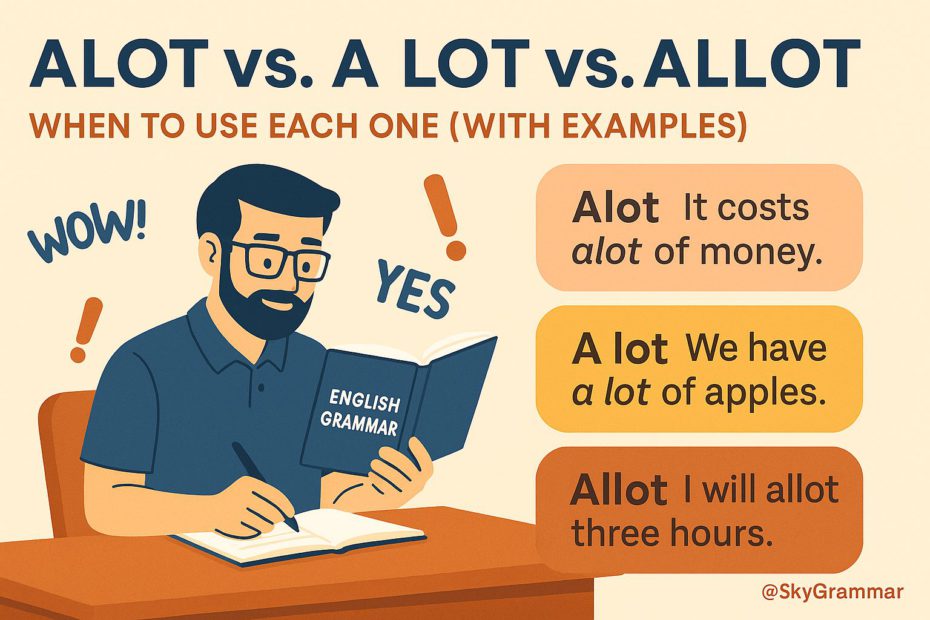English spelling can be confusing, especially when similar-looking words have completely different meanings—or one of them isn’t even a real word! A perfect example of this confusion involves “alot,” “a lot,” and “allot.”
You’ve likely seen these terms used interchangeably or even incorrectly online, in casual writing, or on social media. But if you want to write clearly, professionally, and correctly, it’s important to understand the difference between them.
In this post, we’ll break down the usage of “a lot,” clarify why “alot” is incorrect, and explain when “allot” is the right choice.
📌 Is “Alot” a Word?
A common question that arises is whether “alot” is actually a valid word.
The answer is no—“alot” is not recognized as a correct word in standard English usage.
Although it appears frequently in informal writing, especially on the internet, it’s a misspelling of the phrase “a lot.” The correct form always includes a space: a lot.
So, if you’re wondering whether to write “I have alot of work” or “I have a lot of work,” the second one is correct.
✅ Correct: There’s a lot of homework waiting for me tonight.
❌ Incorrect: I have alot of work to do today.
If you ever feel unsure, just remember: “alot” is never the right choice.
✅ What Does “A Lot” Mean?
“A lot” is an informal phrase that means “a large quantity,” “many,” or “very often.” It functions as a quantifier in English and is commonly used in everyday speech and writing.
Examples of “a lot”:
- We ate a lot of food at the party.
- She talks a lot when she’s nervous.
In all of these examples, “a lot” functions like other quantifiers such as “many” or “much.”
Important Notes:
- “A lot” is informal. In academic or formal writing, it’s often better to use alternatives like:
- Many
- Numerous
- A great deal
- Considerable
For instance:
❌ Informal: He has a lot of experience in the field.
✅ Formal: He has considerable experience in the field.
✍️ How to Use “A Lot” in Sentences
Here are a few more examples that demonstrate how “a lot” works in different contexts:
As a subject:
- A lot has changed since you left.
With verbs:
- We learned a lot during the workshop.
- They argue a lot, but they still get along.
In negative sentences:
- I don’t like driving a lot at night.
Just remember: “a lot” should always be written as two separate words. No exceptions!
🔄 What Does “Allot” Mean
Now that we’ve cleared up the confusion around “a lot” and “alot,” let’s talk about “allot.”
“Allot” is a verb that means to assign, distribute, or allocate something—often for a particular purpose or among specific people.
Examples of “allot”:
- Each student was allotted 30 minutes for the exam.
- We need to allot enough time for each speaker.
- The organization allotted funds to different community projects.
“Allot” always involves the idea of setting something aside—time, money, resources, etc.—for a particular use.
🧠 Common Mistakes to Avoid
Many English learners and even native speakers mix up “a lot” and “allot” because they sound similar. Here are a few quick tips to help keep them straight:
✅ Use “a lot” when:
- You’re referring to quantity or frequency.
- Example: She drinks a lot of water.
✅ Use “allot” when:
- You’re talking about assigning or giving a portion of something.
- Example: We will allot 15 minutes for Q&A.
❌ Never use “alot”:
- It’s not a word, even if it looks right at first glance.
📝 Easy Memory Tricks
Still finding it hard to remember? Here are a few quick tricks:
- Think of “a lot” as similar to “a bunch”—it needs a space.
- Remember that “allot” has “lot” in it, but also begins with “all”—as in “assign to all” or “allocate.”
- Picture a grammar teacher shaking their head every time someone writes “alot.”
🔄 Synonyms to Expand Your Vocabulary
If you’re looking to avoid overusing “a lot” in writing, here are some good alternatives:
Formal Alternatives:
- Numerous
- A significant amount
- Considerable
- Abundant
Informal or Casual:
- Loads (UK informal)
- Tons
- Heaps
- A bunch
Example:
- Instead of saying, “She has a lot of shoes,” you might say:
- “She owns an impressive collection of shoes.”
- “She has countless pairs of shoes.”
🧩 Final Thoughts
To sum it up:
| Term | Part of Speech | Meaning | Correct Usage | Example |
|---|---|---|---|---|
| a lot | Phrase | Many / much | Yes | I read a lot. |
| allot | Verb | Assign or distribute | Yes | We will allot 10 minutes. |
| alot | ❌ Not a word | — | ❌ Never use | ❌ I have alot of work. |
Language evolves, and informal usage can sometimes bend the rules, but writing “alot” will always be incorrect in standard English. Use “a lot” when referring to a large amount, and choose “allot” when you mean to assign or distribute something. With these distinctions in mind, your writing will be clearer, more accurate, and grammatically sound.
✍️ Quick Practice
Try identifying whether “a lot” or “allot” should be used in the following sentences:
- We need to ______ enough time for discussion.
- She talks ______ during meetings.
- I have ______ of respect for her work ethic.
Answers:
- allot
- a lot
- a lot
Understanding these commonly confused terms can greatly improve your writing and communication. So the next time you’re tempted to write “alot”—pause, remember what you’ve learned, and make the right choice!

